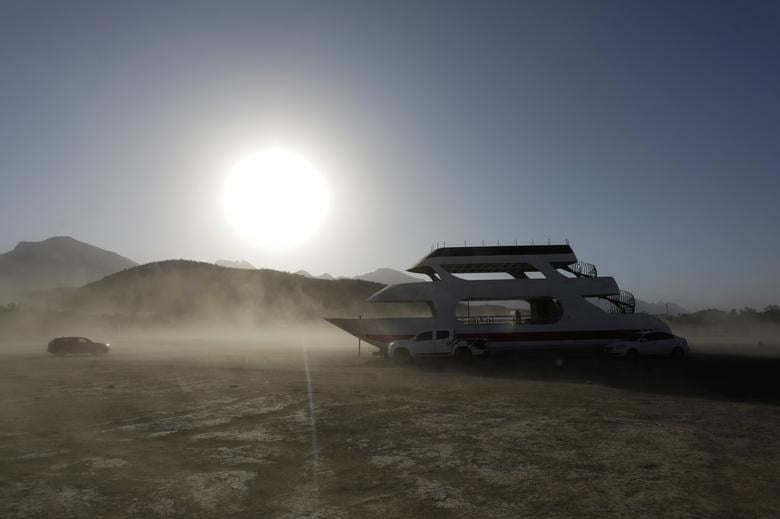More than half of world's largest lakes, reservoirs drying up: Study
This places humanity's future water security at risk, with climate change and unsustainable consumption being the main culprits.
-

A boat sits on the dried basin of the La Boca dam as more than half of Mexico faces moderate to severe drought conditions, in Santiago, Mexico, March 22, 2022. (Reuters)
More than half of the world's greatest lakes and reservoirs are disappearing, threatening humanity's future water security, with climate change and unsustainable usage to blame, a new study revealed.
"Lakes are in trouble globally, and it has implications far and wide," Balaji Rajagopalan, a professor at the University of Colorado Boulder and co-author of the paper, which appeared in Science, said as quoted by AFP.
"It really caught our attention that 25 percent of the world's population is living in a lake basin that is on a declining trend," he continued, meaning that some two billion people are impacted by the findings.
Lakes, unlike rivers, have received little scientific study, despite their crucial role in water security, according to Rajagopalan.
But high-profile environmental disasters in large water bodies like the Caspian Sea and the Aral Sea mirrored a wider crisis.
To investigate the subject thoroughly, the team, which comprised experts from the United States, France, and Saudi Arabia, examined Earth's largest 1,972 lakes and reservoirs using satellite images from 1992 to 2020.
They concentrated on bigger bodies of freshwater due to the greater precision of satellites at a wider scale, as well as their value to humans and animals.
To assess how lake capacity changed over nearly 30 years, they combined photos from Landsat, the longest-running Earth observation program, with water surface height measured by satellite altimeters.
The results: water storage in 53 percent of lakes and reservoirs decreased at a rate of around 22 gigatonnes per year.
During the whole study period, 603 cubic kilometers (145 cubic miles) of water was lost, which is 17 times the amount of water in Lake Mead, the biggest reservoir in the United States.
The researchers utilized statistical models including climatic and hydrologic patterns to break out natural and human-driven elements to determine what drove the trends.
For natural lakes, much of the net loss was blamed on climate warming, as well as human water consumption.
Increased temperatures from climate change drive evaporation but can also lessen precipitation in some places.
"The climate signal pervades all factors," said Rajagopalan.
Lakes losing volumes worldwide
One shocking aspect was that lakes in both wet and dry regions of the world are losing volume, indicating the "dry gets drier, wet gets wetter" paradigm that is frequently used to summarize how climate change affects regions doesn't always hold.
Losses were discovered in humid tropical Amazonian lakes, as well as Arctic lakes, indicating a trend that is more widespread than projected.
Storage loss in drying reservoirs has been blamed on accumulating sedimentation.
Despite the fact that most worldwide lakes were shrinking, roughly a quarter showed large gains in water storage.
The Tibetan Plateau was one of them, "where glacier retreat and permafrost thawing partially drove alpine lake expansion," as per the report.
The worst #drought in 500 years is hitting #Europe. Would this dangerous warning be enough for governments to act before it's too late?#ClimateCrisis pic.twitter.com/PTMTvWOUff
— Al Mayadeen English (@MayadeenEnglish) August 28, 2022
Hilary Dugan, a scientist who studies freshwater systems at the University of Wisconsin-Madison and who wasn't involved in the study, said as quoted by AFP that the research advanced scientific understanding of lake volume variability, which is of "huge importance."
It is "unique in that it focuses on specific lakes, and reports the amount of water as a volume," she said.
But she added, "It's important to keep in mind that many water supplies are from small lakes and reservoirs," and future research should consider these too.
Freshwater lakes and reservoirs retain 87% of the world's liquid freshwater, emphasizing the importance of developing innovative solutions for sustainable consumption and climate mitigation.
"If a good chunk of freshwater lakes are drying, then you're going to see the impact come to you one way or the other, if not now in the not-too-distant future," said Rajagopalan.
"So it behooves all of us to be good stewards," she concluded.

 4 Min Read
4 Min Read









